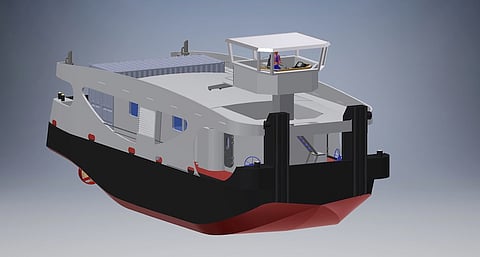

The EU-funded Flagships project is supporting the construction of a hydrogen-powered barge push boat in the French city of Lyon, one that will get its fuel from the Rhone's hydroelectric power.
Expertise from several European countries is collaborating to create a demonstrable commercial hydrogen-fuel cell marine solution.
The Rhone is one of France's major trade arteries and a significant source of renewable electricity for the country. On this 276-kilometre stretch between the port of Marseille and Lyon, 11 hydroelectric power stations generate electricity off the river's flow.
Regular convoys of barges are pushed up and down the river between these two cities – imported cargo upstream and cargo for export downstream. When these barges reach Lyon they are dropped off, and the river tugs pick up another and head off south to the coast.
It is the operations in Lyon where these barges get moved between convoy positions and loading cranes that the new pushboat will operate.
The pushboat design is for two 200kW fuel cells connected to a mobile compressed-hydrogen fuel tank. This fuel tank can be removed and refilled with hydrogen, which will be created at an electrolysis plant using power from the Rhône hydroelectric dams.
The pushboat design will be for a mobile fuel tank with a 300kg compressed hydrogen capacity, enough to power the pusher tug for two weeks. When it is empty it will be replaced by a second tank, and the first one taken by road to the refilling station located just beside the dock area to be refilled with compressed hydrogen.
As this pusher-tug will operate in the city centre of Lyon – one of its other proposed roles will be for the municipal authorities dealing with special garbage barges on the city's riverside – safety has to be a priority.
"We are working closely with the French administration and with class as there are no rules on how to put hydrogen on these vessels" said Victor Laravoire, Newbuilding Project Manager at transport group Sogestran, which owns subsidiary Compagnie Fluviale De Transport, a member of the Flagships project and future owner of the hydrogen push boat. "We want to be sure we do not miss anything. We are helping build the next set of safety rules for the use of hydrogen-powered fuel cells."
With the design of the push tug well advanced, CFT has tenders out for a yard to build the vessel for a planned delivery in mid-2021.
Participating companies in the Flagships project include nine European partners, with two shipowners (Norled and CFT), the maritime OEM ABB, supplier of power and automation solutions Westcon Power and Automation, and naval architect LMG Marin.
Fuel cell technology is being provided by Ballard Europe and vessel energy monitoring and management by PersEE. Management, dissemination activities and hydrogen safety expertise are being provided by VTT and industry cluster NCE Maritime CleanTech.
